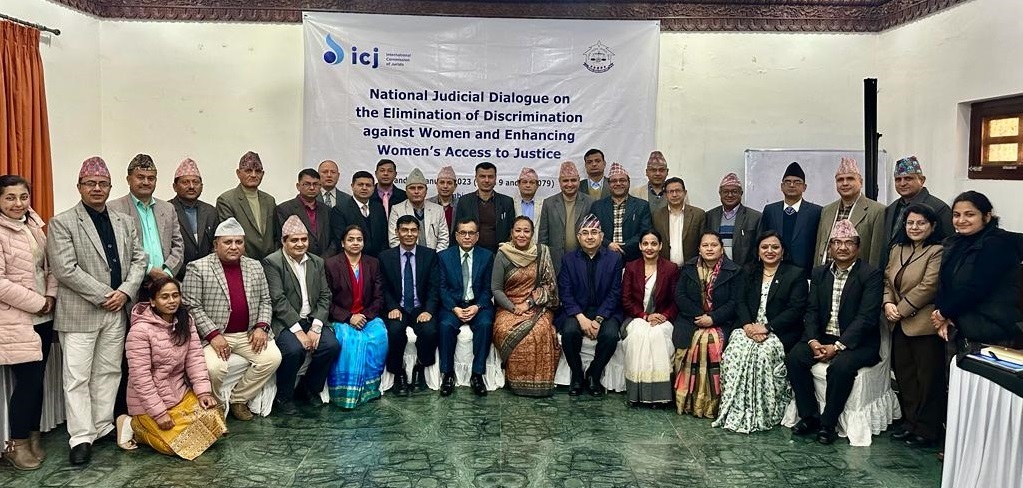Judges underscored the vital role that the judiciary must play in countering harmful gender stereotypes and unconscious bias in order to ensure access to justice for women at a judicial dialogue on the Elimination of Gender Discriminatory Attitudes and Behaviors Towards Women and Enhancing Women’s Access to Justice organized by the International Commission of Jurists (ICJ), in partnership with the National Judicial Academy (NJA) Nepal.
Twenty-five high court and district court judges from Lumbini and Karnali provinces participated in the judicial dialogue, organized under the ICJ initiative on Enhancing Women’s Access to Justice project.
Participants analyzed the major barriers that women are facing in accessing justice and the role that judges, and the Supreme Court in particular, could play to ensure easy access to justice for women. They also suggested that the Supreme Court should play a key role in internalizing the Bangkok General Guidance for Judges on Applying a Gender Perspective (BGG) through amendment of its regulations or incorporating it into court’s strategic planning.
Justice Sapana Pradhan Malla of the Supreme Court of Nepal highlighted that judges should act to avoid gender stereotypes and unconscious bias in the administration of justice to create conducive environment for women to come forward to seek justice.
Justice Malla provided an assessment of the key principles of the UN Convention on the Elimination of Discrimination Against Women, including the concepts of equality, non-discrimination and state obligation. She discussed some jurisprudences of the Supreme Court of Nepal which have set milestone on equality, non-discrimination and women’s access to justice in Nepal.
Justice Hari Prasad Phuyal of the Supreme Court of Nepal discussed the BGG and highlighted the role of judges on gender sensitive adjudication and institutional policies to enhance women’s access to justice.
Advocate Laxmi Pokharel, ICJ Nepal Legal Adviser explained that the Bangkok General Guidance (BGG) is a set of recommendations developed by judges to apply gender perspective to assist judges to eliminate harmful gender stereotype while dealing with cases involving women and enhancing access to justice for women. She highlighted that the objective of the judicial dialogue was to identify gender stereotypical thinking and discriminatory practices in the Nepalese justice system and formulate strategies to eliminate such attitudes and behaviors to ensure access to justice for women.
The judicial dialogue, organized in Lumbini from 23 to 24 January 2023 under the Enhancing Access to justice for women in Asia and the Pacific project, is supported by the Swedish International Development Cooperation Agency (SIDA) and implemented jointly with UN Women and The Office of the High Commissioner for Human Rights.
The PDF of the Bangkok General Guidance in English can be downloaded here
The PDF of the Bangkok General Guidance in Nepali can be downloaded here
Contact
Kaajal Ramjathan-Keogh – Lead, Women’s Access to Justice Project, International Commission of Jurists, t: +27 84 514 8039 e: Kaajal.Keogh@icj.org
Laxmi Pokharel, National Legal Adviser International Commission of Jurists, t: +9779851047588, e: laxmi.pokharel@icj.org

